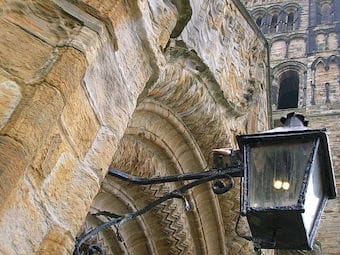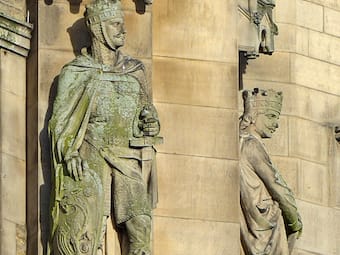The north wall and door of the nave, Durham Cathedral. After his escape, Ranulf made his way to Normandy and took up the cause of Robert II, Duke of Normandy, Henry I’s eldest brother, whom their father William I had passed over as heir. Robert’s rebellion failed, yet Ranulf regained sufficient standing in King Henry’s eyes to be restored to Durham, the See he had acquired — according to William of Malmesbury, for £1000 — in 1099. Ranulf’s lifestyle scandalised the monks but he also enlarged the Cathedral, building much of the nave, and initiated a number of civic improvements.
FAITHFUL friends and tried followers were waiting at the foot of the tower, where they had swift horses in readiness for him, though they were in great terror. Having mounted on horseback with them, he fled with the utmost speed; and escorted by his trusty companions, who had charge of his treasure,* he lost no time in hastening on shipboard, and, crossing over to Normandy, presented himself to Duke Robert.*
The fugitive bishop, being received with welcome, was entrusted with the government of the duchy; and, as far as his indolence permitted, Robert availed himself of his counsels. His principal object was to rouse the duke to engage in hostilities with his brother, using all his efforts to exasperate him against the king. He pointed out the best mode of securing the crown of England, and promised him his aid under all circumstances.
Tr. Thomas Forester (emended)
Ranulf’s treasure went in a separate ship with his mother. During the crossing, the ship was ambushed by Channel pirates, and the treasure plundered. Ranulf’s mother was dumped ‘half-naked’ on a Normandy beach, along with the ship’s crew.
Robert II Curthose, Duke of Normandy, eldest son of William the Conqueror. William named Robert’s younger brother William Rufus as successor, and Robert failed to dislodge him. After another brother, Henry, succeeded William Rufus in 1100, Robert tried again but was defeated once more despite the assistance of Ranulf Flambard, who undoubtedly added bite. Captured in 1106, Robert died in captivity in 1134, a year before the death of his brother Henry I.
Questions for Critics
1. What is the author aiming to achieve in writing this?
2. Note any words, devices or turns of phrase that strike you. How do they help the author communicate his ideas more effectively?
3. What impression does this passage make on you? How might you put that impression into words?
Based on The English Critic (1939) by NL Clay, drawing on The New Criticism: A Lecture Delivered at Columbia University, March 9, 1910, by J. E. Spingarn, Professor of Comparative Literature in Columbia University, USA.
Archive
Word Games
Sevens Based on this passage
Suggest answers to this question. See if you can limit one answer to exactly seven words.
Variations: 1.expand your answer to exactly fourteen words. 2.expand your answer further, to exactly twenty-one words. 3.include one of the following words in your answer: if, but, despite, because, (al)though, unless.
Spinners Find in Think and Speak
For each group of words, compose a sentence that uses all three. You can use any form of the word: for example, cat → cats, go → went, or quick → quickly, though neigh → neighbour is stretching it a bit.
This exercise uses words found in the accompanying passage.
1 Begin. Bishop. Piteous.
2 Against. Catch. Cross.
3 Degree. Engage. Fare.
Variations: 1. include direct and indirect speech 2. include one or more of these words: although, because, despite, either/or, if, unless, until, when, whether, which, who 3. use negatives (not, isn’t, neither/nor, never, nobody etc.)
Confusables Find in Think and Speak
In each group below, you will find words that are similar to one another, but not exactly the same. Compose your own sentences to bring out the similarities and differences between them, whether in meaning, grammar or use.
This exercise uses words found in the accompanying passage.
High Tiles Find in Think and Speak
Make words (three letters or more) from the seven letters showing below, using any letter once only. Each letter carries a score. What is the highest-scoring word you can make?
Your Words ()
Post Box : Ask Nicholas
Grok : Ask Grok
You are welcome to share your creativity with me, or ask for help with any of the exercises on Clay Lane. Write to me at this address:
See more at Post Box.
If you like what I’m doing here on Clay Lane, from time to time you could buy me a coffee.
Buy Me a Coffee is a crowdfunding website, used by over a million people. It is designed to help content creators like me make a living from their work. ‘Buy Me a Coffee’ prides itself on its security, and there is no need to register.
Related Posts
Embarrassed by the behaviour of his Norman bishops and abbots, King William I asked monk Guitmond to come over and set an example.
Picture: © Ethan Doyle White, Wikimedia Commons. Licence: CC BY-SA 4.0.. Source.
Posted August 15 2022
Two monks vying for the abbot’s chair at one of England’s prestigious monasteries each promised King William Rufus handsome rewards for his favour.
Picture: © Tim Green. 2.0.. Source.
Posted July 24 2021
Orderic Vitalis regrets the passing of a society far more refined and advanced than that which supplanted it.
Picture: © Harrie Gielen, Wikimedia Commons. Licence: CC BY-SA 3.0.. Source.
Posted March 19 2020
When the Normans came in 1066 they deliberately destroyed English chant, the last survivor in Western Europe of a tradition five centuries old.
Picture: By Tony Grist, Wikimedia Commons. Licence: Public domain.. Source.
Posted March 18 2020






